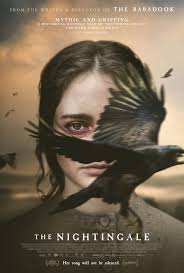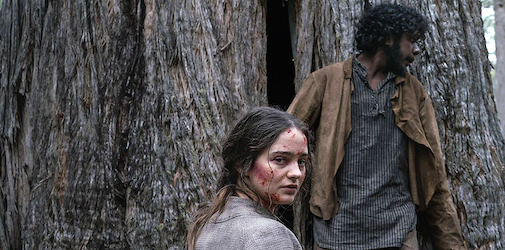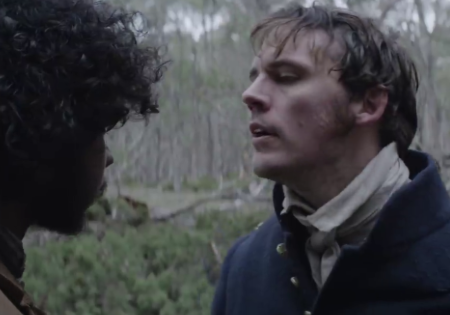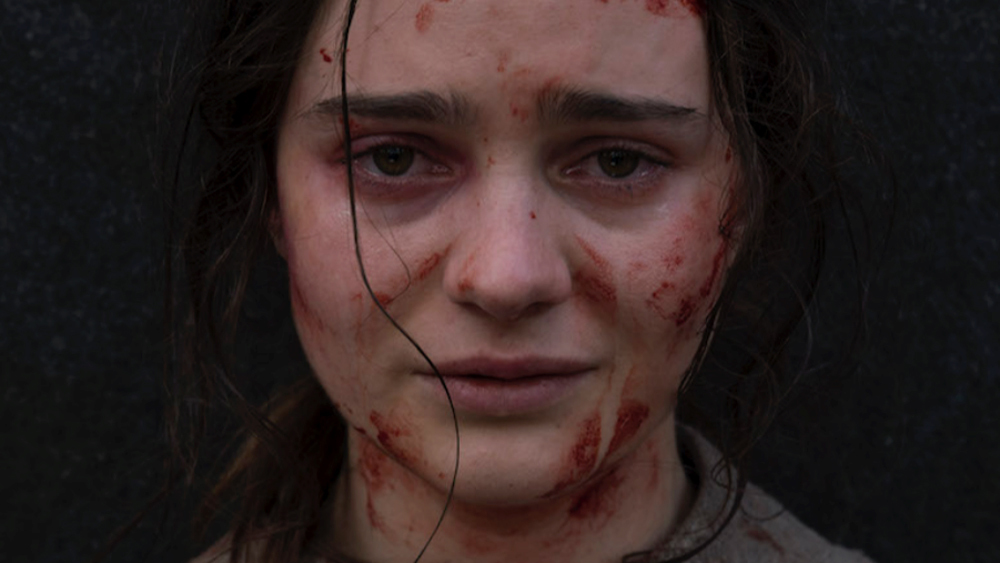by Ben Miller
 In the world of Jennifer Kent’s The Nightingale, no one is safe unless they've won the lottery. If you lucked into being born as a white English male in 19th century Tasmania, you can rest easy in the knowledge you are powerful. If you are a woman, of another race, or from another country, that same luxury is not afforded to you. Death and misery looms around every corner.
In the world of Jennifer Kent’s The Nightingale, no one is safe unless they've won the lottery. If you lucked into being born as a white English male in 19th century Tasmania, you can rest easy in the knowledge you are powerful. If you are a woman, of another race, or from another country, that same luxury is not afforded to you. Death and misery looms around every corner.
The titular Nightingale comes in the form of Clare (Game of Thrones Aisling Franciosi) as she serves as a maid and singer for a group of British officers. She is held there as penance for her crimes of thievery, being Irish and being a woman. She is overseen by Lieutenant Hawkins (Sam Claflin), who is procrastinating processing her release, due to his infatuation with her. Clare’s husband Aidan (a wonderfully warm Michael Sheasby) tries to persuade Hawkins to release her, but to no avail. Things spiral violently out of control. When Clare survives the unthinkable, she seeks revenge on those who have wronged her.
This might read like a simple rape and revenge film on paper, but it is much more nuanced and realistic than that in execution...

Clare is never seen as an equal and everything she says is suspect. When she attempts to get answers in diplomatic and legal ways, she is an assumed liar. As soon as she loses her temper, people take notice. Franciosi has vividly expressive brown eyes and chubby cheeks that raise to a manic pitch when she screams in anger. Even if her voice was lower, you wouldn’t be able to deny her just due. As she begins to exact some level of revenge, she is haunted by the memories of both her family and her victims.
In order to pursue her attackers, she enlists another disenfranchised member of society, Aboriginal tracker Billy (Baykali Ganambarr in a star-making debut). Billy’s race is so low in the social hierarchy, even Clare bosses him around and belittles him. Clare and Billy’s dynamic carries the film. Billy sees the world for how it is, while Clare is fueled by single-minded anger. The only cliché the film indulges is the gradual understanding that emerges between these mismatched partners. Clare sees Billy as a lower-class citizen who could never understand the pain and suffering she has endured. Eventually, Billy is revealed to be one of the few who can empathize with her unimaginable agony. Despite a 136-minute runtime, every scene feels necessary, every encounter harrowing, and every conversation enlightening. The two actors play off each other very well and the warmth they grow into is a welcome respite from otherwise heavy material.

A lot has been made about the rape content of this film, and it is highly unsettling (obviously the point). Rape should not be romanticized or enjoyable, and at no point during the rape scenes is the film the least bit titillating or comforting. There is no justification. Kent also films the assaults in a different way than I have personally ever seen on film. Instead of acting as a third-party voyeur, you are either focused on the face of the women as transformes from agony to numbness, or you see directly from the woman's perspective as to how cold and alienating the violation feels. Does it feel excessive? Yes. Does it feel necessary? Absolutely.
Sam Claflin has the trickiest part to pull off in the film. Lieutenant Hawkins is not a monster just for the sake of being one. His entire agenda is to advance his career and improve his station. The means at which he achieves his agenda is where the monster comes out. His relentless pursuit of power leads to one hideous violation after the other. Claflin has been a likeable performer in other films and it is quite the risk to take on someone so loathsome.
I have to tip my hat to Kent and her production designer Alex Holmes and cinematographer Radek Ludczuk (reuniting with Kent after The Babadook). The film is drenched in grays and browns, echoing the dreary subject matter. Ladczuk really gets the chance to show off during the film’s climatic scenes, buoying between nighttime in the forest, indoors, back into night and ending in the sunshine. Props also go to Oscar-winning sound designer Robert McKenzie, as each tree bristle, bird coo, and sharp gunshot contrast the dread of the film’s setting.
With The Nightingale Kent proves that The Babadook was no fluke. She also provides springboard for the immense talents of Franciosi and Ganambarr. Despite limited commercial prospects (the film has earned $248,000 in a month in US theaters), it's hard not to appreciate Kent’s valiantly sever efforts in showing how disenfranchised members of society have been forced to live in “civilized” parts of the world.

Grade: A-
Oscar Chances: Despite the powerhouse performances and craft expertise, this film seems too niche and controversial to ever gain real awards steam. It could however make a stronger showing at the Independent Spirit Awards or in Kent’s native Australia.